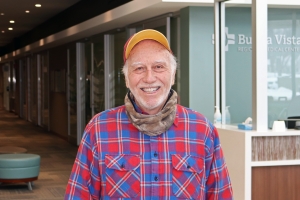 After a colonoscopy revealed a tumor about the size of a golf ball in his colon, Alex Kazos from Storm Lake was thankful he didn’t put off getting a colonoscopy with Buena Vista General Surgery any longer.
After a colonoscopy revealed a tumor about the size of a golf ball in his colon, Alex Kazos from Storm Lake was thankful he didn’t put off getting a colonoscopy with Buena Vista General Surgery any longer.
When asked if he thought his colonoscopy was potentially a life-saving procedure, he said, “Yes, there is no doubt about it.” Kazos continued, “If I hadn’t done something, that tumor would have grown and I might have had more serious health issues.”
His journey started in September of 2022 when he realized he didn’t feel well. “That’s when I thought, something is goofy here. So I did a self-assessment,” said Kazos.
His self-assessment led him to his primary care physician, Dr. Wulfekuhler. After running a few tests and discovering that he had a family history of colorectal cancer, his doctor recommended a colonoscopy.
Kazos’ first colonoscopy was performed nine years ago by Dr. Jason Dierking at Buena Vista Regional Medical Center. “I thought, ‘Do I go to a big city and get this colonoscopy?’ But I had trusted Dr. Dierking from before, and I heard that he is a good surgeon,” said Kazos on his decision to stay local. “Dr. Dierking did a fantastic job.”
Although he had this procedure before, Kazos remarked that the prep you drink before a colonoscopy has changed drastically—for the better. “Nine years ago, I drank this icky stuff that just ran through you. And now, the medical field has elevated so much that what you drink now is not a big deal; it doesn’t taste as bad,” said Kazos. “To me, it was like bad lemonade.”
Kazos also stressed the importance of doing things for your health, even if they may seem uncomfortable at first. “In life, you have to really think about the after effects of something you don’t really want to do. You should get a colonoscopy for yourself, your family and your friends,” said Kazos.
During his experience getting a colonoscopy and his follow-up procedure to remove the golf ball-sized tumor, Kazos noted that he did not feel any pain. Dr. Dierking removed the tumor laparoscopically, meaning without making large incisions in the skin. Kazos joked about his experience, “For my senior modeling career, it’s a lot better; I don’t have a scar on my stomach.”
After removing the tumor, they discovered that one lymph node detected cancer. Kazos then saw Dr. Donald Wender with the June E. Nylen Cancer Center in Sioux City and discovered that he had two options: try chemotherapy or Guardant360®, a blood test that helps physicians determine the right treatment path for patients and if patients need chemotherapy.
“I said, ‘Well, it’s pheasant hunting season,’” remarked Kazos with a laugh, describing why he decided to try Guardant360®; to ensure he could enjoy the hunting season.
His decision paid off, and in January of 2023 during an appointment at BVRMC’s Oncology & Infusion Center, they discovered that Kazos did not need to complete chemotherapy and would instead be monitored every three months in Storm Lake.
“It’s so important to people to have this wing of the hospital; they don’t have to drive elsewhere,” said Kazos about the convenience of BVRMC’s Oncology & Infusion Center. “It will be handy for me, rather than driving 65 miles.”
Throughout his experience, Kazos, who happens to be a previous BVRMC employee, noted how well he felt cared for by the staff and providers. “Everybody is very friendly and professional,” said Kazos. “I knew that when I did valet for four years here. It’s really a great place to work.”
Reflecting on his decision to get a colonoscopy, Kazos said, “I’m glad I did it of course. My family and friends are, too.” Although he may look at a golf ball a bit differently now, he continued, “I can go hunting and golfing again. God answered my prayers.”
According to the American Cancer Society, colorectal cancer is the third leading cause of cancer-related deaths in both men and women in the United States, expecting to cause over 52,000 deaths this year.
Thankfully, colorectal cancer screenings can prevent cancer through early detection and removal of precancerous growths. Colonoscopies are the most common colorectal cancer screening test in the United States and can help reduce colorectal cancer by 40% and death by 60%.
“I’d like to tell people that whether you have a family history of colon cancer or not, please, please, you should do this; I highly recommend it,” said Kazos.
If you are over the age of 45 or have a family history of colorectal cancer, talk to your doctor about when you should get a colonoscopy.
